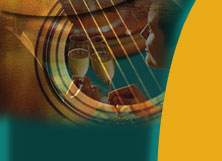Home
|
About
|
Blog
|
Comments |
Contact |
Contribute |
Events |
Links |
Pictures |
Policy |
Press |
Testimonials |
Videos
Press
The History of the Cigar Box Guitar
According to Dr. Tony Hyman, curator of the National
Cigar Museum, cigar boxes as we know them didn’t exist prior to the
1840’s. Until then, cigars were shipped in larger crates containing
100 or more per case. But after 1840, cigar manufacturers started
using smaller, more portable boxes with 20-50 cigars per box.
Cigars were extremely popular in the 19th Century,
and therefore, many empty cigar boxes would be lying around the
house. The 1800’s were also a simpler time for Americans, when
necessity was truly the mother of invention. Using a cigar box to
create a guitar, fiddle or a banjo was an obvious choice for a few
crafty souls.
The earliest proof of a cigar box instrument found
so far is an etching of two Civil War Soldiers at a campsite with
one playing a cigar box fiddle. This etching, copyrighted 1876, was
created by French artist, Edwin Forbes, who worked as an official
artist for the Union Army. The cigar box fiddle appears to sport an
advanced viola-length neck attached to a ‘Figaro’ cigar box. In
addition to the etching, plans for a cigar box banjo were possibly
published circa 1870's by Boy Scout’s founder, Daniel Carter Beard
in St. Nicholas Magazine.
The plans, entitled ‘How to Build an Uncle Enos
Banjo’ showed a step-by-step description for a playable 5-string
fretless banjo made from a cigar box. Searching through an online
archive of the St. Nicholas magazine does not immediately reveal
that Daniel C. Beard wrote an article with this same title, however.
It is more likely that the plans for the Uncle Enos Banjo were first
printed in the American Boy’s Handy Book in 1883 as supplementary
material in the rear of the book as suggested in its prologue.
(Beard, Daniel Carter (1883). The American Boy's Handy Book. New
York: Scribner. ISBN 0879234490. )
The Cigar Box guitars and fiddles were also
important in the rise of jug bands and blues. As most of these
performers were black Americans living in poverty, many could not
afford a "real" instrument. Using these, along with the wash tub
bass (similar to the cigar box guitar), jugs, wash boards, and
harmonica, black musicians performed blues during socializations.
The Great Depression of the 1930s saw a resurgence
of homemade musical instruments. Times were hard in the American
south and for entertainment sitting on the front porch singing away
their blues was a popular pastime. Musical instruments were beyond
the means of everybody, but an old cigar box, a piece of broom
handle and a couple wires from the screen door and a guitar was
born.
A modern revival of these instruments (also known as
the Cigar Box Guitar Revolution) has been gathering momentum with an
increase in cigar box guitar builders and performers. A loose-knit
tour of underground musicians tour the East Coast (US) each summer
under the banner "Masters of the Cigar Box Guitar Tour." These
musicians include Doctor Oakroot, Johnny Lowebow, Shane Speal, Tomi-O
and many others. Also, there is a growing number of primitive
luthiers adding cigar box guitars to their items for sale on their
websites and eBay.
An all-cigar box guitar record label has even been
formed to further promote the revolution. Insurrection Records is
run by Shane Speal (also a cigar box guitarist and curator of the
National Cigar Box Guitar Museum). The label releases "homemade CDs
of homemade recordings of homemade instruments," and is known for
their 'outsider art' handmade packaging for the discs. Currently the
label only sells their wares on eBay. A compilation of cigar box
guitar recordings, Masters of the Cigar Box Guitar Vol. 2 is
scheduled for release in 2007.
Modern revival is sometimes due to interest in jug
band and the DIY culture, as cigar box is relatively inexpensive
when considering other factors, such as strings and construction
time. Many modern cigar box guitar can thus be seen as a type of
practice in lutherie, and implement numerous own touches, such as
additional of pick up and resonator cones into it.
Another factor in the current revival can be
attributed to many musicians desire for a more primal sound. Blues
guitarists, in particular, have picked up the cigar box guitar in an
attempt to play Delta Blues in its purest form.
(Wikipedia)
|
For More Information
|
|
 |
|
Members of the press who need
additional information or
materials
are encouraged to contact us
HERE
|
|
CUSTOM MADE CIGAR BOX GUITARS

Visit our Cigar Box
Blog
Wiki
Squidoo
Mojo
Mojo Hand Song
Mojo Hand Videos
Blues Boy Mojo
Google
Cigar Box Nation
Contact Us
Copyright 2021
© ® Mojo Hand Guitar Co.
|





